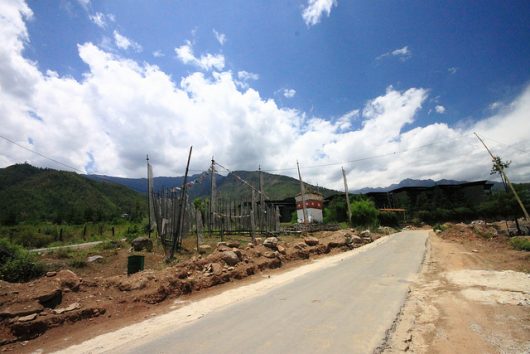Why is Bhutan Poor?

Why is Bhutan poor? The landlocked country, located in the eastern region of the Himalayan Mountains, is one of rich culture and strong national pride. Despite the lack of infrastructure and small economy, Bhutan is considered to be the happiest country in Asia. It is also one of the poorest, with a striking poverty rate of 12%. Factors such as rugged landscape, lack of education and intangible government goals all contribute to answering this question: Why is Bhutan poor?
Difficult Landscape
Due to its location in the Himalayas, Bhutan’s terrain is extremely hilly and rugged. It also has no contact with any body of water. This makes movement throughout and beyond the country extremely difficult. The lack of mobility further impacts the ability of the Bhutanese government to make health care and education readily available throughout the country.
Lack of Education
Most children have to walk two to three hours to find a primary school. Consequently, 47% of the population above the age of six is uneducated. Without an education, finding a job becomes extremely difficult. Most jobs require specialized skills, so the impoverished Bhutanese population is often limited to either subsistence farming, trading or laboring.
Farmers, especially in rural regions, are severely limited in capital and resources and often work for the bare necessities. Given that 96% of the poor live in rural areas, most of them get stuck in a vicious cycle of poverty. Even if they were to get enough capital to produce more, due to inadequate access to markets, they would not be able to take part in much trade. Consequently, education certainly plays a big factor in answering the question, why is Bhutan poor?
Natural Disasters
Bhutan is often struck by natural calamities due to its mountainous landscape. Floods and landslides make it impossible for any major infrastructural development to take place. This also increases the cost of goods and services. These natural disasters also affect residents’ health by causing an increase in diseases such as malaria and tuberculosis. This can prevent already poor families from going to work and increase medical costs.
Despite these sub-par living conditions, the government continues to focus on Gross National Happiness instead of improving the economy. With such a large proportion of the population living under the poverty line, Bhutan must rise up and focus on tangible objectives.
Recently, the government has implemented legislation, such as the National Rehabilitation Programs and the Rural Economic Advancement Program, that aim to help needy individuals by giving them land and better socioeconomic opportunities. Bhutan may have a long way to go, but these programs have certainly propelled them in the right direction and away from the question: why is Bhutan poor?
– Tanvi Wattal
Photo: Flickr
